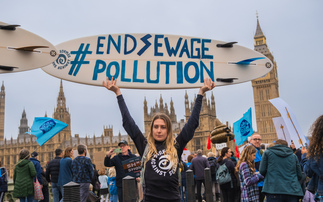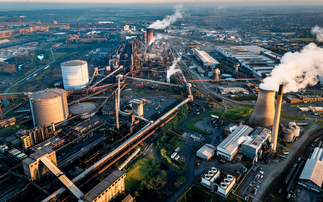Richard Black reflects on how money talked during the opening of COP21
Cynics have always said that money lies at the heart of the UN climate process.
The first day of these potentially seminal Paris talks partially proved them right on the money; but not on the cynicism.
Public and private sectors came to the party, with money pledged for both fundamental aims of the UN climate convention: reducing emissions, and helping poor nations prepare for impacts that are inevitable.
For clean energy, a doubling in governments' R&D spend to $20bn, and further research billions from private investors such as Bill Gates through an new initiative called the Breakthrough Energy Coalition.
And $500m from the World Bank and donor governments to create the Transformative Carbon Asset Facility, which will help developing countries implement schemes to incentivise emission cutting in areas such as transport and urban development.
On the adaptation side, we saw $248m pledged from 11 donor nations to help the poorest countries prepare and adapt. And there's a little more due on forests too, we hear.
However... while this kind of figure dominated some of the countless analyses flying out of the Le Bourget convention centre on this busiest of days, in truth the opening session of the summit was dominated by two sets of human figures.
One was the succession of leaders and other luminaries who took their brief turns at the podium. The other consisted of memories - of the 130 killed two and a half weeks ago here in one of the bloodiest terrorist atrocities ever committed on European soil.
We built it, they came
Altogether, 147 world leaders addressed the summit, including China's President Xi Jinping - the first time that the highest ranked of all Chinese officials has addressed the UN climate convention, a sign of how seriously this once suspicious nation now takes the climate and clean energy agenda.
President Xi did not disappoint, talking of using a climate agreement to build "a community of shared future for mankind" that could inspire in other areas of human endeavour.
"We should create a future of win-win cooperation, with each country making contribution to the best of its ability," he said. "For global issues like climate change, a take-more-give-less approach based on expediency is in nobody's interest."
For the US, President Obama was in similar form, if slightly longer-winded (running 10 minutes over time, not that anyone in the conference centre appeared to mind) - urging leaders to find "common purpose [for a] world that is not marked not by conflict but by cooperation - not by human suffering but human progress".
Over the last 18 months, China and the US have engaged in a diplomatic dance that appears now to be well-honed; each has learned the steps, and manages to avoid treading on its partners' toes.
But there are of course many more than two dancers on this particular floor, and although all seemed more or less in step on Day One, it was the least typical of all days here.
For the rest of this week we will be in traditional negotiator mode; and only then will we see whether the leaders' words have built a legacy of goodwill and ambition that can sweep away entrenched prejudices, ramparts and habits, or whether today's quickstep will turn into the stompiest of slow marches.
Syrian shadow
The dead of 13th November were also felt here.
Speaker after speaker remembered them and talked of solidarity with the people of Paris. In fact, it had been noticeable how many leaders committed to come only after the atrocities.
But one sensed that the dead of Bataclan and elsewhere in the city cast a different kind of shadow too.
In a recent TV interview, Prince Charles recalled the scientific evidence suggesting that the Syrian conflict was made more likely by climate change acting through the medium of severe drought.
And, as Barack Obama put it, a world in which climate change progresses unhindered is a world that is more likely to feature ‘submerged countries; abandoned cities; fields that no longer grow; political disruptions that trigger new conflict; and even more floods of desperate peoples seeking sanctuary in nations not their own.'
The intended link was unmissable. It is not a link with which every scientist agrees -Britain's Mike Hulme sounded a dissenting note yesterday - but there it was, looming large in the conference hall. Many countries here other than France have, of course, also suffered through the brutal outspillings of Middle Eastern conflict.
Counting the cost
Which brings us back, in a sense, to money.
The costs of combatting climate change, of significantly reducing greenhouse gas emissions on the timescale mapped out by the Intergovernmental Panel on Climate Change, are fairly easily calculated in principle, though assumptions can always be confounded by human progress.
But what are the costs of not curbing greenhouse gas emissions, when the risks of not doing so could one day be measured in additional human conflict? And how do you even formulate the question, when our technical capacity to assess the additional risk is in its current embryonic state?
Whatever approach you might take, the sums mentioned at the beginning of this article - a couple of billion dollars here, a few hundred million there - are small beer indeed.
Which may be why UK Prime Minister David Cameron went for the vision thing, asking (rhetorically, one imagines, rather than actually to his Chancellor): "How could we argue to our grandchildren that it (combating climate change) was too difficult... when in London alone there's five trillion dollars of funds under management?"
The next two weeks will go a long way to deciding how much explaining Mr Cameron might one day have to do. The numbers that really count emerge a week on Friday.
Richard Black is director of the European Climate Intelligence Unit
This article is part of BusinessGreen's Road to Paris hub, hosted in association with PwC.








